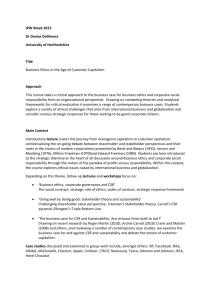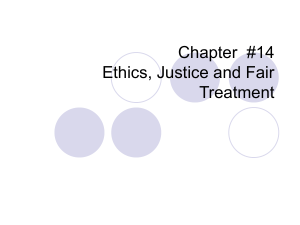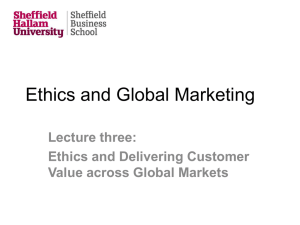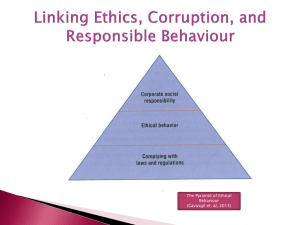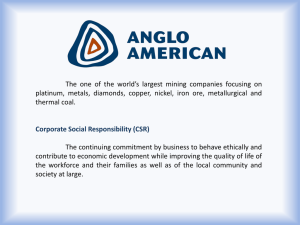Business Ethics in the Age of Customer Capitalism
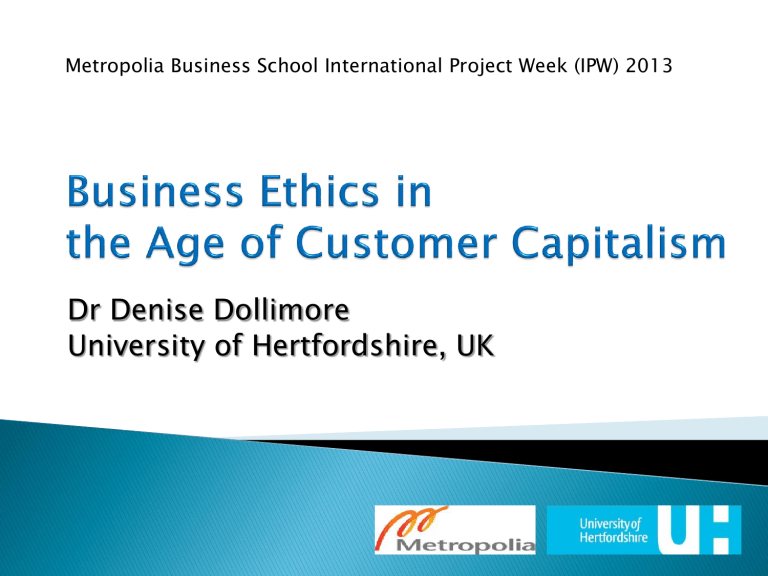
Metropolia Business School International Project Week (IPW) 2013
Dr Denise Dollimore
University of Hertfordshire, UK
Dr Denise Dollimore
Senior lecturer in Strategic Management
University of Hertfordshire Business School, UK
Researcher in Group for Research in Organizational
Evolution (GROE) www.uhbs-groe.org
And you?
your degree programme… your interest in business ethics…
Theories, perspectives and debates
The case study method and ethical issues
Monday
Business ethics in the age of customer capitalism
Tuesday
Business ethics, corporate governance and corporate social responsibility
Wednesday
Doing well by doing good: Stakeholder theory
Thursday
The business case for CSR and sustainability: are virtuous firms built to last?
Evaluate ethical
issues
from a range of strategic management perspectives
Apply ethical and organizational situations and choices
values
to
Apply theory to devise and justify decision
strategies
for dealing with ethical dilemmas
What is Business Ethics?
What does it mean to you?
Definitions of Business Ethics
An ‘oxymoron’! – bringing together of two contradictory concepts (Collins 1994)
‘Principles of conduct within organizations that guide decision making and behavior’ (David 2008)
Good business ethics is a prerequisite for good strategic management
‘The application of ethical principles to organizations to either understand, judge, or direct individual and organizational ethical decision making ’ (King & Lawley 2013)
Companies experience “social blowback” when stakeholders perceive that they have breached their deal with society
Thomas Donaldson (2007)
Meanwhile…
The ‘social contract’ of business in society is continually evolving
Sandra Waddock (2010)
Nike 1996: use of child labour
2010 Financial crisis: accounting practices @Lehman Bros
‘cosmetic accounting’; over-leveraged / inadequate liquidity/financial losses
BP 2010: oil spill Gulf of Mexico (environmental damage)
Primark 2009-2013: Indian sweatshops/building collapse
McDonalds 2009: Obesity and unhealthy eating
Barclays 2007-2013: Libor scandal (rate fixing)
Tesco 2013: Horsemeat scandal (food contamination)
Finnish examples?
Crane, Matten and Spence (2008)
Companies have responded to increasing expectations by advocating what is now a common term in business:
Corporate Social Responsibility (CSR).
Most large companies now feature CSR reports, managers, departments, and the subject is increasingly promoted as a core area of management next to marketing & accounting
The business case for CSR continues to be hotly debated
While others take more nuanced view…
Roger Martin (2010) Harvard Business Review
“For three decades, executives have made maximizing shareholder value their top priority. But evidence suggests that shareholders actually do better when firms put the customer first”
“It’s time to discard the popular belief that corporations must focus first and foremost on maximizing value for shareholders. The idea is inherently, and tragically, flawed”
Following the era of CEO owners (Rockefellers/Carnegies)
Two major eras of Modern capitalism:
Managerial Capitalism (from1930s)
Berle & Means (1936) The Modern Corporation & Private Property
Firms need to have professional management
Shareholder value Capitalism (from1970s)
Jensen & Meckling (1976) Theory of the Firm: Managerial
Behaviour, Agency Costs and Ownership Structure
Purpose of every corporation should be to maximize shareholder wealth.
Roger Martin’s critique
Data shows that focus on shareholder value has actually earned lower returns since corporations adopted it as their guiding principles.
The harder a CEO is pushed to increase shareholder value, the more the CEO will be tempted to make moves that actually hurt the shareholders.
The better approach is to make customer value the top priority, as Johnson & Johnson and Procter & Gamble have done. These two companies have generated shareholder returns that are at least as high as, if not higher than, those of leading shareholder-focused companies
What do you think…?
Johnson and Johnson’s credo (since 1943)
“We believe our first responsibility is to the doctors, nurses and patients, to mothers and fathers and all others who use our products and services…We are responsible to our employees, the men and women who work with us throughout the world…We are responsible to the communities in which we live and work and to the world community as well…Our final responsibility is to our stockholders…When we operate according to these principles, the stockholders should realize a fair return.”
What Martin calls ‘customer capitalism’
The Principles at work: Procter and Gamble
CEO not focused on shareholder value and fixated on share price is freed up to concentrate on building up the business
Procter and Gamble: 90% of compensation of CEO, Lafley, was in stock options, the vested period (period before owned unconditionally) of which will begin a year after his retirement and last 10 years.
If more companies made customers the top priority, the quality of corporate decision making would improve because thinking about the customer forces you focus on improving your operations and the products and services you provide, rather than on spinning lines to shareholders.
ethical values, issues and choices…
Ethical values : shared beliefs about right and wrong, good and bad
Govern the behaviour of a person or a group
Ethical issues : problems or dilemmas which present a conflict of values
Pay a ‘living wage’ or personal financial gain
Ethical choices : decisions about which option to take in response to a dilemma
Difficult decisions, because each option has its own drawbacks
Ethical dilemmas…
Crane and Matten [2004] 2010, Business Ethics , Oxford University Press
Collins, J. W. 1994, Is Business Ethics an Oxymoron? Business Horizons , Sept-Oct: 1-8
David, F. 2009 Strategic Management: Concepts and Cases
Donaldson, T. 2007, ‘“Ethical blowback”: the missing piece in the corporate governance puzzle – the risks to a company which fails to understand and respect its social contract’
Corporate Governance Vol 7. Issue 4
Jensen and Meckling, 1976, Theory of the Firm: Managerial Behaviour, Agency Costs and
Ownership Structure. Journal of Financial Economics.3:305-60
Waddock, S. (2010) ‘The Social Contract of Business in Society’ eds. in Aras and Crowther
A Handbook of Corporate Governance and Social Responsibility 2010 pp. 69-82
‘The Social Contract between business and society is constantly evolving...More recently forces of globalization have placed multinational corporations in the position of being the most powerful institutions on the planet, and simultaneously companies have faced criticism about their roles and impacts.’
(Waddock 2010)
Companies have evolved their corporate responsibility stances, from a reactive CSR stance
(reacting to external crises & offering charitable contributions), to a more responsive stance involving voluntary systems of responsibility assurance (codes of ethics, industry standards, etc).
CSR manages the paradox of profitability and responsibility
The early message ‘doing well by doing good’ (Freeman, 1984)
CSR imposes political functions of govt on corporate executives
CSR has failed to create the good society – expecting too much from business
Close adherence to CSR agenda leads to falling profits over time
Difficulty in allocating rights responsibilities and enforcing them
– who decides?
Stakeholder Theory the way forward – CA through building superior relationships. Notable that some scholars dropping the use of the term ‘CSR’ but retaining that of ‘ethics’ (while others use these terms interchangeably!)
Jury is still out – you decide!
